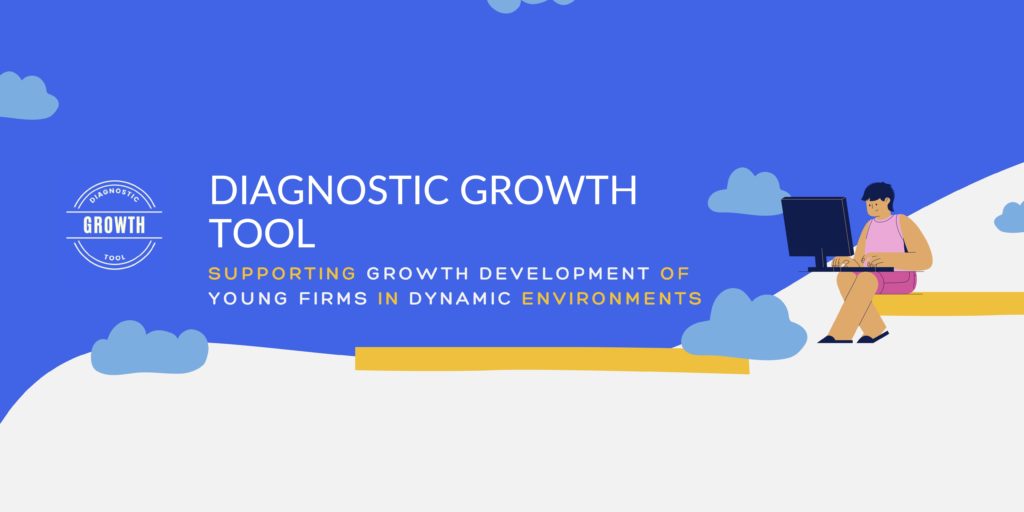Diagnostic Growth Tool – Information
What it the diagnostic growth tool?
The diagnostic growth tool (DGT) – short for diagnostic and improvement growth toolkit – is an automated tool that assesses young firms that are aiming for (or are already in the process of) growth. The tool diagnoses the firm on multiple levels (individual, firm, environment) and provides information on their development of key capabilities that can aid the overcoming of specific challenges of the growth process. Each report is individualised based on every participating firm’s results.
Why was the tool developed?
The DGT has been developed in the context of the SPEED (Smart Port Entrepreneurial Ecosystem Development) project and aims to support the growth development of young firms, operating in dynamic environments. The tool itself has been developed around the focal point of the High-Tech industry, since dynamism in those environments is obvious and confronting firms every day. Nevertheless, it is applicable to a larger audience as well. Specifically, firms operating in environments that contain much uncertainty, fast technological changes and/or market-demand fluctuations, can benefit from the reported results as well.
What is it based on?
During our research process we talked to both experts (e.g., WSX Enterprise, Scaleups.eu, CITC, JADS, University of Antwerp, AMS) and growing tech-based companies (see our blog section for some of our conversations) on the topic of growth-process difficulties. We found that growth itself remained a difficult hurdle to overcome, but not for the general reasons known to us. It went a lot deeper than that. Young firms are all too often focused on the entrepreneurial side of the story, neglecting the more strategic side of long-term entrepreneurship and underestimating the value of capability development. While an entrepreneurial focus only, is great and probably effective at the earlier years of the firm, it can become an issue at a later stage if the strategic aspect is not entered into the equation, eventually also constraining growth.
For more information on
the 3 principles that are core to the tool,
check out our launch webinar!
Based on a combination of ongoing academic research and practical insights, we developed a tool that provides value by not only assessing firms on their current capability development, but also provides them a new perspective on growth and informs them on how to better prepare their firms for growth-enablement in the future.
How does it work?
The DGT was developed with the intention of enabling firm managers to get a clearer picture of their firm’s base development processes and how these relate to their growth-objectives. Therefore, it is not a prescriptive utility, which means that it will not provide a “one-stop-shop” for attaining growth. It is more realistic in the sense that it starts with diagnosing a couple of key elements and their essential development in the participating firms. Then, the tool will provide individualised output reports with recommendations based on each firm’s results.
Using these output results, firms are encouraged to reflect on how this operationalises into their own firms. To fully benefit from the outputs, the SPEED project organises 4 interactive workshops that allow firms to not only get more in-depth insights on their own reporting results, but to also engage with industry peers and discuss their perspectives on similar or difficult challenges.
What other activities accompany the tool?
As stated above, a couple of events will take place to support the full integration, dissemination, understanding, and implementation of the toolkit into the larger context of firms and their individual results:
- 4 interactive workshops – find out more on these here.
- TomorrowPorts conference – the 4th workshop will take place at the TomorrowPorts conference. To find potential collaborations, get to know the developing Smart Ports Ecosystem or to connect to multi-industry peers, join the SPEED team at the conference!
How does the tool fit into the larger SPEED project?
The SPEED project aims at developing an ecosystem that can bring together two different worlds that could develop a great deal of value when brought together. Specifically, the port community contains a particular need for technological advancements and solutions for solving their most critical problems, while technology entrepreneurs contain the potential to act as solvers and innovators for these problems. Yet until recently, these communities experienced a large gap between one another which was based, among others, on the lack of knowledge concerning potential collaborative opportunities.
The SPEED project has a number of experts in all fields (both academic and practical) working on integrating and developing this ecosystem. To make sure every aspect of the equation is covered, multiple partners are engaged in the port-stakeholder side of the story, while others are focusing more on the technological aspects surrounding innovation, and still others are immersed in the entrepreneurship side of the story. The diagnostic growth tool is part of the latter.
By focusing on supporting the development of young, tech-based firms, the diagnostic growth tool wants to enable better partnerships with firms that are better prepared to not only develop innovations over the shorter term, but grow over the longer term. In this way, the ecosystem not only supports the port community in their technological advancement, but also technological entrepreneurship in its growth potential. Thereby contributing to strengthening the core of the ecosystem as a whole.
Watch our launch webinar here to find out more on the tool and how it was developed:
—–
——
—–
Do you have any questions? Please check out our FAQ-page, to see whether your question has not already been answered. If that is not the case, please contact the Diagnostic and Improvement Toolkit Research Team.
The Research Team
Morane Atzmon, Ph.D. Researcher at University of Antwerp (or via LinkedIn)
Johanna Vanderstraeten, Professor of Entrepreneurship at University of Antwerp
